|



Best viewed
in 800x600 screen resolution
|

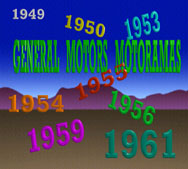 |
The
GM Motoramas were auto shows staged by General Motors off and on
from 1949 to 1961. Eight Motoramas were held during this
period. To understand their reason for being we must go
back to the early 1940’s and the start of World War II.
The war halted the design and production of civilian automobiles
while the plants produced war machinery. Auto design and
engineering lay dormant and cars produced after WWII were basically
the same as those produced before the war with minor face lifts.
Demand was very high for new cars when the war ended but production
was hampered by the lack of some raw materials. |
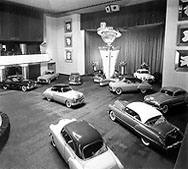 |
By
1949 production had caught up with demand and this made 1949 a
pivotal year in both auto design and potential sales. What
better way to show your new line of cars and boost sales than
a large auto show with lots of people and a lot of press?
The
1949 extravaganza showed in two cities, New York and Boston.
The combined attendance was 591,971. The 1950 Motorama
showed in New York only and was attended by 320,000 people.
|
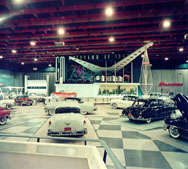 |
On
January 17, 1953, the first GM Motorama to feature futuristic
dream cars opened at the Waldorf Astoria hotel in New York City.
Seven days later, it had drawn more than 300,000 people.
The show stopper, and most famous dream car, was the Corvette
by Chevrolet. This truly American fiberglass sports car was indeed
a first. In addition to the Corvette, the Wildcat,
Le Mans, and Starfire were also constructed
of fiberglass. Although all the dream cars displayed were
beautiful in their own right, the completely new fiberglass bodied
cars drew the most attention. |
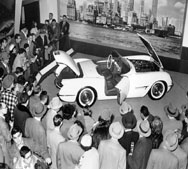 |
The
crowd in this photo pushes forward to get a look at the "Corvette,"
one of the first of many dream cars that were to become a hallmark
at the next three Motoramas. The dream cars were a pattern to
the future and GM used the Motoramas to observe the public’s
reactions to the futuristic designs and mechanical marvels. Dream
cars influenced the design of General Motors cars for years to
come and people liked what they saw. General Motors also liked
what they saw and more shows were on the drawing boards. Each
Motorama was to become more elaborate than the one before. |
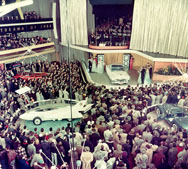 |
An
opening crowd of 30,784 "oohed and aahed" the all-new
Motorama in the grand ballroom of the Waldorf Astoria on January
21, 1954. A 27-piece orchestra complete with a 12-voice
chorus provided a musical background for six shows each day.
The crowds were entertained by fashion models, a Broadway cast,
and wide-screen movies. Highlighting this show was a truly
experimental gas turbine car, the XP 21 Firebird.
Displayed on elevated turntables were six "dream cars,"
continuing the quest by GM engineers, stylists, and researchers
for the pattern of the future. |
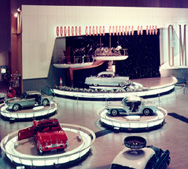 |
If
automobile lovers around the country enjoyed the 1954 Motorama,
the best was yet to come. On the evening of January 29, Bob Hope
hosted a special CBS TV preview, taking millions of American viewers
through the GM Motorama of 1955. On the 80-ton stage in
the Waldorf Astoria, the production opened with all of GM’s
cars. Displayed on steel arms that swung out of a ten-foot "cloud"
of flash powder, the cars hovered above an 800-square foot pool
of water for the public’s inspection. Strategically
displayed around the huge ballroom were the "dream cars"
selected for the ‘55 show. |
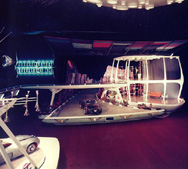 |
The
Highway of Tomorrow display in the 1956 Motorama was
a work of art. Not only was the display futuristic, but
the vehicle featured, the Firebird II, was on the cutting
edge of innovation, and the second of three turbine cars that
would appear in the Motoramas. Five new Dream Cars
for 1956 were on display in addition to the Firebird II.
Chevrolet led off with the Impala, followed by Pontiac’s
Club de Mer, Oldsmobile’s Golden Rocket,
the Buick Centurion and Cadillac’s Brougham
Town Car. The show's 63 exhibits and 26 production
cars occupied 26,000 square feet of ballroom space plus adjoining
rooms. |
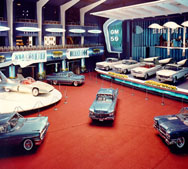 |
The
1959 and 1961 Motoramas used productions cars and elaborate displays
as the show’s main draws. Gigantic mechanical arms, nicknamed
"grasshoppers," were used to display the cars on stage.
To the amazement of the crowd, the five show cars were lifted
up and propelled forward by the giant grasshopper-like devices.
The main attraction in the ’59 show was the Firebird III
gas turbine car. It was the only "dream" car in the
show and was displayed on an elaborate revolving turntable across
from the main stage. The undercarrage was also displayed separately. |
|